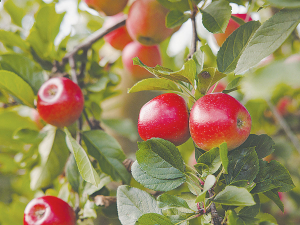Rockit Global appoints COO
Rockit Global has appointed Ivan Angland as its new chief operating officer as it continues its growth strategy into 2025.
 Rockit Global Limited is expanding its footprint with the first Rockit apples now growing in the South Island.
Rockit Global Limited is expanding its footprint with the first Rockit apples now growing in the South Island.
Kiwi apple company, Rockit Global Limited, is expanding its footprint with the first Rockit apples now growing in the South Island.
Rockit Global chairman John Loughlin says, in the next 20 years, horticulture has the potential to transform the rural Canterbury landscape.
“Growing apples uses significantly less water, requires markedly lower nitrogen inputs than either dairy or arable production and, as a perennial crop, doesn’t require annual cultivation,” Loughlin says.
Rockit general manager commercial Tom Lane says a key part of the company’s strategy is geographical diversification.
“Hawke’s Bay and Gisborne remain home for Rockit, but we are looking to ensure the long-term resilience of our growing footprint,” Lane says.
“We are using climate scenario modelling to identify new growing regions and see Canterbury becoming a prime region for horticultural production in New Zealand in coming years,” he adds.
Rockit’s first South Island partner is Turley Farms.
“Murray and Margaret Turley have a well-deserved reputation as excellent growers at the forefront of innovation and diversification,” Lane says. “We are proud to have them as our first commercial partner in the South Island.”
The Turleys have been significant and innovative producers in Canterbury for more than 50 years, transforming low productivity, dry crop and stock properties into high-value vegetable and arable land.
In 2012, they bought into Dairy Holdings which runs 63 dairy farms and 20 support blocks and, the following year, created Farmers Mill, which produces all the flour for Griffins NZ. The state-of-the-art facility allows local growers to mill their own wheat, demonstrating the Turleys’ strength in collaborating with other farmers and like-minded businesspeople. Onion processing plant, Southern Packers is another of their ventures.
In 2021, Turley agronomist Dominic Cosgrove visited Hawke’s Bay to study the viability of planting apples on a Turley property in Rangitata. The resulting trial orchard, planted under the 2D system with dripline irrigation, gave the Turleys the confidence to align with Rockit.
The joint venture between Rockit and Turley Farms has seen an initial 20 hectares of Rockit™ apples planted this year. The parties are looking for a third partner to join them to take the total development to at least 100 hectares over the next three years. An Information Memorandum is planned to be released this month, where qualified parties will be invited to inspect the development in November.
Murray Turley, CEO of Turley Farms Ltd, says Turley Farms began exploring the potential for growing pip fruit in South Canterbury two and a half years ago.
"During this exploration, Rockit™ apples emerged as a standout opportunity, offering excellent eating characteristics, a unique consumer proposition and brand, great growing support and premium returns for growers,” he says.
“After 15 months of discussions, Rockit and Turley Farms are thrilled to announce the establishment of a joint venture, marking the beginning of a new era for the pip fruit industry in Canterbury.”
According to the latest Federated Farmers banking survey, farmers are more satisfied with their bank and less under pressure, however, the sector is well short of confidence levels seen last decade.
Farmer confidence has taken a slight dip according to the final Rabobank rural confidence survey for the year.
Former Agriculture Minister and Otaki farmer Nathan Guy has been appointed New Zealand’s Special Agricultural Trade Envoy (SATE).
Alliance Group has commissioned a new heat pump system at its Mataura processing plant in Southland.
Fonterra has slashed another 50c off its milk price forecast as global milk flows shows no sign of easing.
Meat processors are hopeful that the additional 15% tariff on lamb exports to the US will also come off.